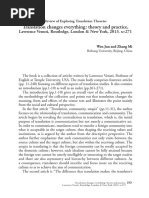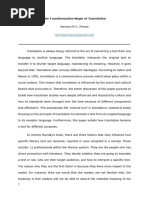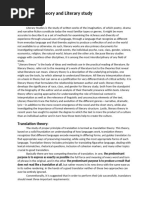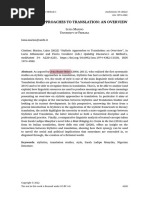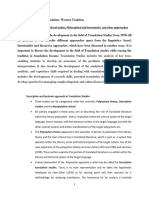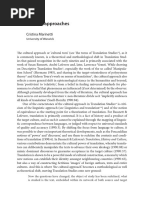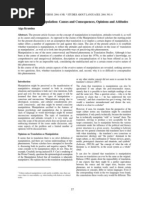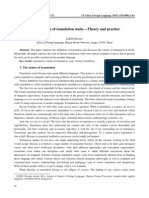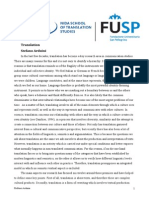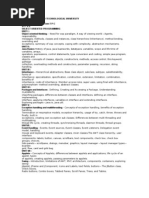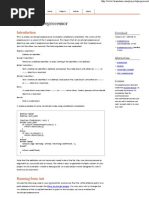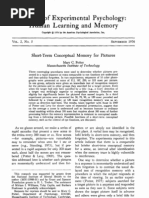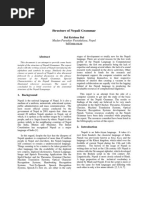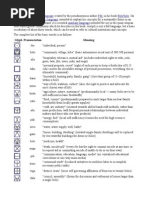Translation and Power: Manipulation School, Tymockzco, Gentzler Romina Ghorbanlou
Translation and Power: Manipulation School, Tymockzco, Gentzler Romina Ghorbanlou
Uploaded by
Romina GhorbanlouCopyright:
Available Formats
Translation and Power: Manipulation School, Tymockzco, Gentzler Romina Ghorbanlou
Translation and Power: Manipulation School, Tymockzco, Gentzler Romina Ghorbanlou
Uploaded by
Romina GhorbanlouOriginal Title
Copyright
Available Formats
Share this document
Did you find this document useful?
Is this content inappropriate?
Copyright:
Available Formats
Translation and Power: Manipulation School, Tymockzco, Gentzler Romina Ghorbanlou
Translation and Power: Manipulation School, Tymockzco, Gentzler Romina Ghorbanlou
Uploaded by
Romina GhorbanlouCopyright:
Available Formats
Translation and Power: Manipulation School, Tymockzco, Gentzler
Romina Ghorbanlou
In translation studies there are three important schools: The Manipulation School, the Leipzig School, and the
Nitra School. In the Leipzig School, the emphasis is mainly on the linguistic aspect of translation, the original
text and equivalence, which is exactly the opposite of the Manipulation School. In the case of the Nitra school,
literal translation has the most importance and it also pays attention to the text itself. In the manipulation
school, on the other hand, the focus is on the target text and it mainly considers functionalist, formalist and
descriptive translation studies. In this school, the translator does not have to write the target text exactly like
the original, and some changes and omissions may occur due to a certain goal, and the translators try to
achieve this goal so that the reader of the target text can understand some points, so it is basically related to
the functionalist approach. This partiality of translation makes the act of translation partial, in other words,
the translator is also seen as partial. Manipulation comes from the background of comparative studies, and it
assigns functions to translations, and it is under the power of the ideology of the target culture. André
Lefevere believes that translation is rewriting, and Hermans agrees with this idea, but sees translation as
rewriting in the service of power, and this rewriting is done on the basis of the norms of society. Hermans
claims that all translations are manipulations. Translation is seen as secondary to the source text, and he
blames the translator for this because he has an important role in the linguistic aspect and form of translation.
Hermans also talks about the polysystem theory how translation is marginal only in some exceptional
situations and so translation gets a secondary status and value. But in the case of manipulation, translation is
an important tool of literature that can create a new source or genre. So in the polysystem view, translation is
power and will be at the center of the polysystem. He also talks about descriptive, goal-oriented, boundaries
and norms of translation that make it grow rapidly. Bassnet and Lefevere see translation as a tool for
exercising power in societies, translators try to learn this as well as learn how to influence their readers.
Gentzler asks the question: why power? He claims that if we look at the meaning of the word power, besides
its meaning in physics, it means the ability to influence and control. Since the middle of the 19th century, after
the world war, some changes were applied to cultural and civic issues that caused cultural control.
Manipulation had a great impact on cultures and societies that cannot be overlooked. At the end of the 20th
century, there were some movements such as post-structuralism, post-colonialism, etc., which brought about
a cultural turn in translation, as a result of which new books and journals were published on the subject.
Parallel to this cultural turn, scholars from different fields and subjects studied translation and its effects,
scholars such as Homi Bhabha (talks about translation culture) and Gayatri Spivak (studies translation from the
feminine and political point of view). The agency of the translator is an important aspect of the cultural turn.
The literature of postcolonialism and the thinking of poststructuralism lead to agency in the following aspects:
cultural dominance, cultural assertion, and cultural resistance. It should be mentioned that studies in this field
have proved that translation does not need knowledge before it is started, and knowledge is acquired after
translation, so translation does not always help the one in power, cultural dominance, but it can be helpful for
the oppressed. Translators have a mediating position, they are neither on the side of power, nor on the side of
oppression. The process of translation is heterogeneous because there is more than one way to use it for
power. It is not only the translated parts of the texts that have meaning, but also the removed or deleted
parts.
You might also like
- As Regras de David XDocument92 pagesAs Regras de David Xpepeca100% (1)
- Of Mice and MenDocument39 pagesOf Mice and Menmonkey.mags0275% (4)
- Translation As A Purposeful ActivityDocument10 pagesTranslation As A Purposeful ActivitySunny Wang50% (2)
- Translation Changes Everything: Theory and Practice,: Lawrence Venuti, Routledge, London & New York, 2013. x+271Document2 pagesTranslation Changes Everything: Theory and Practice,: Lawrence Venuti, Routledge, London & New York, 2013. x+271Wafaa Abdel AzizNo ratings yet
- WK 8 Consonants Single or DoubleDocument4 pagesWK 8 Consonants Single or DoubleJhonna Marie SolisNo ratings yet
- Translation and Gender--Reading on Louise Von FlotowDocument3 pagesTranslation and Gender--Reading on Louise Von FlotowZaryab ButtNo ratings yet
- Chapter Ii)Document9 pagesChapter Ii)Anna IsaverdyanNo ratings yet
- Inglese IDocument22 pagesInglese ImaryzirpoliNo ratings yet
- Presas, Nerissa Fe C. CTP in TranslationDocument6 pagesPresas, Nerissa Fe C. CTP in TranslationjaydiericmNo ratings yet
- Venuti - The Scandals of TranslationDocument3 pagesVenuti - The Scandals of TranslationNusa50% (2)
- Translation and Political EngagementDocument30 pagesTranslation and Political EngagementveckstNo ratings yet
- Heilbron PDFDocument13 pagesHeilbron PDFAilu GeraghtyNo ratings yet
- Translation and Political EngagementDocument21 pagesTranslation and Political EngagementFaysal KhalifaNo ratings yet
- Translation Theory and Literary StudyDocument3 pagesTranslation Theory and Literary StudyvaleumanacheungNo ratings yet
- Book Review Companion To Translation StudiesDocument3 pagesBook Review Companion To Translation StudiesFrank MollejonNo ratings yet
- Translation As A Cultural World System - HeilbronDocument19 pagesTranslation As A Cultural World System - Heilbronlily. zNo ratings yet
- Lecture 11Document12 pagesLecture 11Nandi ChinniNo ratings yet
- Chapter 8: Cultural and Ideological Turns Postcolonial Translation TheoryDocument16 pagesChapter 8: Cultural and Ideological Turns Postcolonial Translation TheorymahamNo ratings yet
- Politics of Translation: - Gayatri Chakravorty SpivakDocument5 pagesPolitics of Translation: - Gayatri Chakravorty SpivakTina ThomasNo ratings yet
- The History and The Origin of The Theory of Translation. Its Place Among Other SciencesDocument44 pagesThe History and The Origin of The Theory of Translation. Its Place Among Other SciencesMarina MisiatsNo ratings yet
- 111735-Article Text-309336-1-10-20150122Document14 pages111735-Article Text-309336-1-10-20150122Tchatchouang fadiNo ratings yet
- 4к_ТП_ Л1_Linguistic approach to tr-n_24_SDocument5 pages4к_ТП_ Л1_Linguistic approach to tr-n_24_SНаталія БендасNo ratings yet
- Niranjana 1998 Feminism and Translation in India Contexts Politics FuturesDocument14 pagesNiranjana 1998 Feminism and Translation in India Contexts Politics FuturesferboitoNo ratings yet
- 15558-Article Text-59443-1-10-20220921Document16 pages15558-Article Text-59443-1-10-20220921heba aliNo ratings yet
- Paper 1Document26 pagesPaper 1Anwesha PhukanNo ratings yet
- MAEng 18Document5 pagesMAEng 18Kishu GuptaNo ratings yet
- Culture As Translation Intersemiosis and Intersemiotic Translation-1Document14 pagesCulture As Translation Intersemiosis and Intersemiotic Translation-1Jasmina MilojevicNo ratings yet
- The Linguistic Approach To TranslationDocument4 pagesThe Linguistic Approach To TranslationMartin HopeNo ratings yet
- Marinetti Cultural Approach PDFDocument5 pagesMarinetti Cultural Approach PDFWafaa Abdel AzizNo ratings yet
- Translation Discourse and Conflict - BrownlieDocument17 pagesTranslation Discourse and Conflict - BrownlieTzoutzoukinaNo ratings yet
- Cultural and Ideological TurnsDocument3 pagesCultural and Ideological TurnsninoNo ratings yet
- Translation studiesDocument43 pagesTranslation studiesMuhammad NadeemNo ratings yet
- V. Leonardi Do Men and Women Translate Differently ExtractDocument14 pagesV. Leonardi Do Men and Women Translate Differently ExtractMgerhtaplNo ratings yet
- The Cultural Turn of The 1980sDocument19 pagesThe Cultural Turn of The 1980sAnis AhmadiNo ratings yet
- Structure of Applied Translation Studies According To J. Holmes and G.Toury.Document8 pagesStructure of Applied Translation Studies According To J. Holmes and G.Toury.Yurii VakulchikNo ratings yet
- Polysystem TheoryDocument5 pagesPolysystem TheoryAbdullah Ktk100% (1)
- On Translation and Social Change in The Philippines PDFDocument5 pagesOn Translation and Social Change in The Philippines PDFwilderthanwildeNo ratings yet
- Types of Translation TransformationsDocument13 pagesTypes of Translation TransformationsAnnajNo ratings yet
- Exploring Translation TheoriesDocument4 pagesExploring Translation TheoriesАлина Зацепина100% (1)
- Translation As ManupulationDocument5 pagesTranslation As ManupulationCarla MuradNo ratings yet
- IngleseDocument3 pagesInglesecarmcantNo ratings yet
- 007Document6 pages007JaynaNo ratings yet
- Feminist Praxis in Translation - Literature ReviewDocument16 pagesFeminist Praxis in Translation - Literature ReviewgoldenflorainternationalNo ratings yet
- REPORT STYLISTICSDocument10 pagesREPORT STYLISTICSJoshua ApolonioNo ratings yet
- Assignment 2nd PartDocument6 pagesAssignment 2nd PartVinodNo ratings yet
- Spivac Politics of Translation-NoteDocument2 pagesSpivac Politics of Translation-NoteMunavvira MinnuNo ratings yet
- Translation Political TextsDocument22 pagesTranslation Political TextsRahatNo ratings yet
- A Comparative Study On The Two Chinese Versions of The Color Purple From Perspective of Feminist TranslationDocument5 pagesA Comparative Study On The Two Chinese Versions of The Color Purple From Perspective of Feminist Translationheba aliNo ratings yet
- A Brief Introduction of Skopos TheoryDocument4 pagesA Brief Introduction of Skopos TheoryluluNo ratings yet
- Translation Studies AFinLaDocument18 pagesTranslation Studies AFinLaNoureldin Mohamed AbdelalNo ratings yet
- Reflection of Translation StudyDocument4 pagesReflection of Translation StudynanadadaNo ratings yet
- Munday Chapter 7 Systems TheoriesDocument22 pagesMunday Chapter 7 Systems TheoriesFedorchuk AnnaNo ratings yet
- Polysystem TheoryDocument4 pagesPolysystem TheoryMuhammedNo ratings yet
- Types of TranslationDocument16 pagesTypes of TranslationSaachi GroverNo ratings yet
- Hatim and Mason The Semiotic Level of Context and Discourse 2Document12 pagesHatim and Mason The Semiotic Level of Context and Discourse 2amany100% (3)
- Researching The Translation of Chinese Political DiscourseDocument28 pagesResearching The Translation of Chinese Political DiscourseLucaW.TinnirelloNo ratings yet
- Translation and Nation: Negotiating "China" in the Translations of Lin Shu, Yan Fu and Liang QichaoFrom EverandTranslation and Nation: Negotiating "China" in the Translations of Lin Shu, Yan Fu and Liang QichaoNo ratings yet
- Stefano Arduini - Translation PDFDocument16 pagesStefano Arduini - Translation PDFpvas1No ratings yet
- Lesson 1 TranslationDocument4 pagesLesson 1 TranslationAlina MocanuNo ratings yet
- Translation StudiesDocument7 pagesTranslation Studiessanamachas100% (1)
- Juri Lotman's Translator's Handbook: What a translation manual would look like if written by LotmanFrom EverandJuri Lotman's Translator's Handbook: What a translation manual would look like if written by LotmanNo ratings yet
- A Comparative Study on the Translation of Detective Stories from a Systemic Functional PerspectiveFrom EverandA Comparative Study on the Translation of Detective Stories from a Systemic Functional PerspectiveNo ratings yet
- Comparatives: Grammar WorksheetDocument1 pageComparatives: Grammar WorksheetIsabela VázquezNo ratings yet
- Suggestive Curriculum of B.ed. For C.C.S. UniversityDocument60 pagesSuggestive Curriculum of B.ed. For C.C.S. Universityabhishek.mishrajiNo ratings yet
- Language and GenderDocument24 pagesLanguage and Gendergotengohan73100% (1)
- Ecm-Oops Through JavaDocument2 pagesEcm-Oops Through Javam1u2n3n4i5No ratings yet
- Ancient Egypt Research Project - CompleteDocument16 pagesAncient Egypt Research Project - CompleteMahmoud YounesNo ratings yet
- Soal Ulangan " Mid Semester Ganjil ": "Akreditasi A"Document2 pagesSoal Ulangan " Mid Semester Ganjil ": "Akreditasi A"hariyani aniNo ratings yet
- Sneha ResumeDocument4 pagesSneha Resumeale AnnamNo ratings yet
- Reported SpeechDocument16 pagesReported SpeechAhmed Badran100% (1)
- Syllabus of B.ADocument15 pagesSyllabus of B.AAbhijeet Kumar0% (1)
- Properties of Regular Languages: Reading: Chapter 4Document58 pagesProperties of Regular Languages: Reading: Chapter 4Muhammad Ehtisham HassanNo ratings yet
- let-english-reviewer-3Document142 pageslet-english-reviewer-3francomagabo49No ratings yet
- Anthology An Anthology Ofchinese Literature: Beginnings ToDocument42 pagesAnthology An Anthology Ofchinese Literature: Beginnings ToPrashant ChauhanNo ratings yet
- Hours) :-L. (I) (Ii) India. 2. (I) : (?Art-Ii) U/T T, TSHDocument2 pagesHours) :-L. (I) (Ii) India. 2. (I) : (?Art-Ii) U/T T, TSHSohailNo ratings yet
- EXAM 8th. GRADE FIRST PARTIAL NOVEMBER 2024Document3 pagesEXAM 8th. GRADE FIRST PARTIAL NOVEMBER 2024Damián GuzmánNo ratings yet
- Restoring Universality To The Subject: Lacan'S Kantian Logic of Sexuation Derek HookDocument14 pagesRestoring Universality To The Subject: Lacan'S Kantian Logic of Sexuation Derek HookFranciscoJinganNo ratings yet
- DLL - English 6 - Q3 - W6Document8 pagesDLL - English 6 - Q3 - W6RHO ANNE NICOYCONo ratings yet
- Detailed Lesson Plan (Free Online English Class 2023)Document42 pagesDetailed Lesson Plan (Free Online English Class 2023)Hsu Yadanar TheinNo ratings yet
- Macro and Macro PreprocessorDocument72 pagesMacro and Macro PreprocessorNitin Birari0% (1)
- 1the English Verb Tenses Test GrammarDocument2 pages1the English Verb Tenses Test GrammarMustafa DayanırNo ratings yet
- Javascript Pre ProcessorDocument3 pagesJavascript Pre ProcessortezuyaNo ratings yet
- Lesson 1 - Last Summer: Form B - Extra GrammarDocument5 pagesLesson 1 - Last Summer: Form B - Extra GrammargcardimNo ratings yet
- Journal of Experimental Psychology: Human Learning and MemoryDocument14 pagesJournal of Experimental Psychology: Human Learning and MemoryralphllnNo ratings yet
- PDF Ef3 Pre Int Short Film Scripts - CompressDocument7 pagesPDF Ef3 Pre Int Short Film Scripts - CompressJeremy SNo ratings yet
- Ieee PaperDocument5 pagesIeee PapersurajamitNo ratings yet
- Structure of Nepali Grammar: Bal Krishna BalDocument67 pagesStructure of Nepali Grammar: Bal Krishna BalUmesh MishraNo ratings yet
- Asa'piliDocument2 pagesAsa'piliTechnical PhantomNo ratings yet
- Critical Thinking SkillsDocument25 pagesCritical Thinking SkillsSamir BoucharefNo ratings yet



